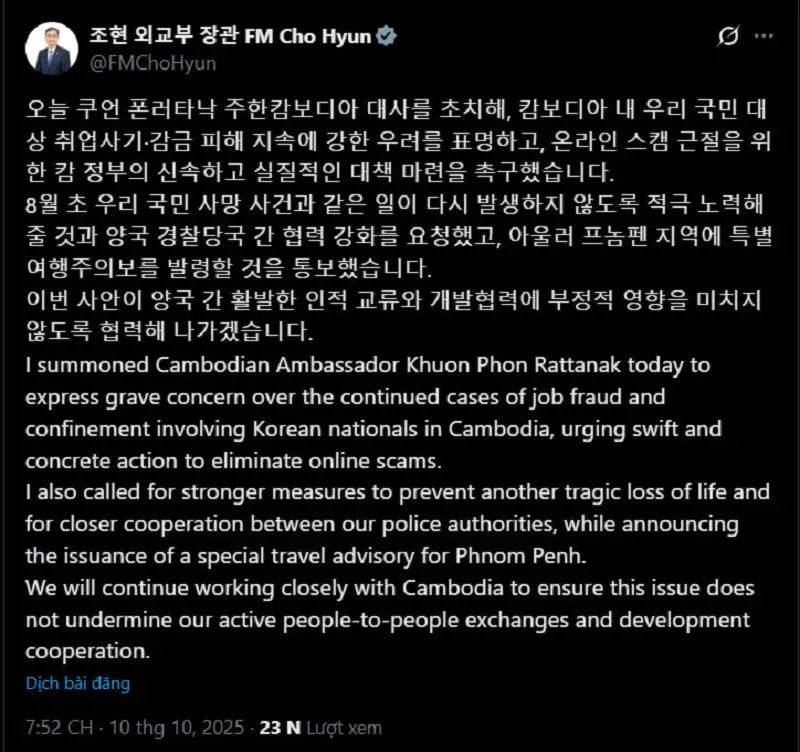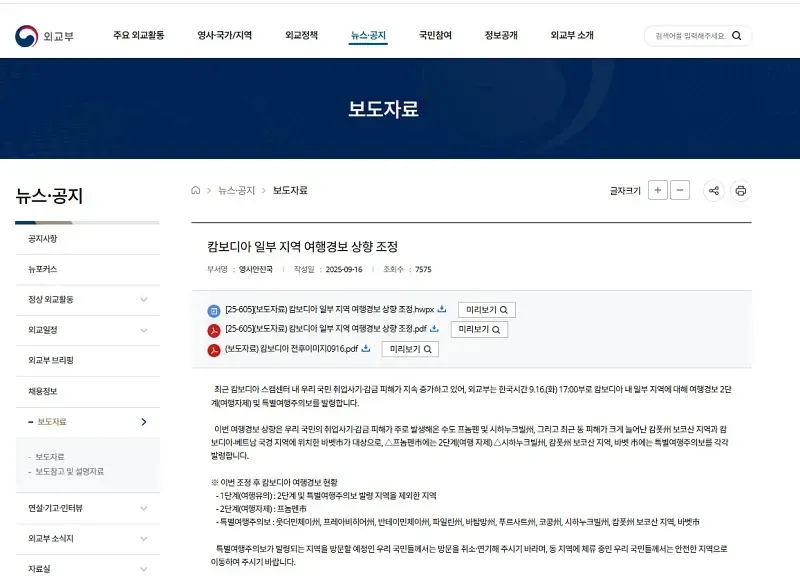(TAP) - Recently, the case of a South Korean student who traveled to Cambodia and was then kidnapped, tortured, and killed has shocked public opinion. The Seoul government summoned the Cambodian Ambassador to South Korea to lodge a strong protest and demand safety guarantees for its citizens. However, this is not the only case…
On October 10, South Korean Foreign Minister Cho Hyun posted on his "X" account (조현 외교부 장관 FM Cho Hyun) that he had summoned Cambodian Ambassador Khuon Phon Rattanak to express deep concern over recent developments. Minister Cho Hyun stated that scams targeting South Korean citizens in Phnom Penh are on the rise, and called on the Cambodian side to take swift and strong measures to eliminate fraud and abductions. In addition, the South Korean government representative emphasized the need for both sides to strengthen cooperation between police and relevant authorities to ensure prompt responses to emergency situations. According to the 중앙일보 on October 11, the Cambodian Ambassador to South Korea acknowledged Seoul’s concerns and said he would report the matter to his government.

South Korean Foreign Minister Cho Hyun summoned Cambodian Ambassador Khuon Phon Rattanak to discuss the case of a South Korean student who was lured to Cambodia and later tortured to death. Source: X “조현 외교부 장관 FM Cho Hyun”
According to South Korean media outlet 뉴스1 on October 12, the 22-year-old victim (referred to as “A”), was a university student from North Gyeongsang Province. He left South Korea on July 17 to attend an exhibition in Cambodia. About a week later, his family received a phone call from a man speaking a mix of Chinese and Korean, demanding 50 million won (approximately USD 35,000) to "resolve a problem" allegedly caused by A. Suspecting foul play, the family immediately reported the incident to the police and contacted the South Korean Embassy. However, four days later, all communication with the blackmailers was completely cut off.
On August 8, A’s body was discovered near Bokor Mountain in Kampot Province - believed to be the site where he was held captive. According to the investigation report, the victim had been severely tortured, leading to cardiac arrest. The death certificate issued by Cambodian police listed the cause of death as "cardiac arrest due to extreme pain."
However, the victim’s body has not yet been repatriated to South Korea. Due to extensive procedures required for autopsy and cremation in Cambodia, the return is expected to take place by the end of October. This prolonged delay has left the victim’s family in deep anguish, with some describing the experience as feeling like their son was “killed twice”, his body still kept in a freezer in a foreign country. A source who spoke to 뉴스1 on October 12 said that A had been beaten so badly that he could neither walk nor breathe, even after receiving medical attention.

South Korea advises its citizens not to travel to Cambodia unless absolutely necessary. Source: 대한민국 외교부
In a related development concerning scams targeting South Korean citizens, 기호일보 reported on October 12 that two other South Korean nationals, who had been held captive in Sihanoukville, Cambodia, were rescued after enduring 160 days of torture. The two victims were deceived into joining a phone scam network while seeking high-paying jobs. They were freed from captivity on October 2 through a rescue operation led by lawmaker Park Chan-dae of the South Korean Democratic Party. The victims confirmed that many fellow nationals remain imprisoned.
At the end of September, lawmaker Park Chan-dae submitted a proposal to the National Assembly to amend the Consular Assistance Act (영사조력법). In his proposal, he called for enhanced monitoring and early assessment of cases involving South Korean citizens abroad, as well as swift responses to reports of missing persons. According to Park, many South Koreans are still waiting to be rescued, and their families back home are desperately awaiting news. He emphasized that quick action and close cooperation are crucial to securing the “golden hour” in rescuing citizens.
According to data reported on October 3 by the South Korean Ministry of Foreign Affairs, cited by KBS, incidents of South Korean citizens being kidnapped and extorted in Cambodia have rapidly increased. While there were only 10 to 20 cases annually between 2022 and 2023, the number surged to 220 last year and reached 330 in just the first eight months of this year.
Amid the growing concerns, since September 17, South Korea has raised the travel alert level for Phnom Penh to Level 2 (travel restrictions) and issued a special Level 2.5 warning for high-risk areas such as Sihanoukville, Bokor Mountain, and Bavet. The South Korean Ministry of Foreign Affairs also advises citizens to avoid traveling to Cambodia unless absolutely necessary.
Not only South Korea, but many other countries have also expressed outrage over a series of scams, kidnappings, and detentions of migrant workers on Cambodian territory. Although the Phnom Penh authorities have launched crackdowns, the problem remains complex and ongoing. Recently, Vietnam has carried out multiple rescue operations, repatriating thousands of its citizens who were lured and forced into illegal labor, subjected to beatings, and other abuses in these areas. However, a major question remains unanswered: How many more people, and citizens of how many other countries, continue to endure torture and exploitation in what is known as an “autonomous zone” beyond the reach of law?
Selena Kim
